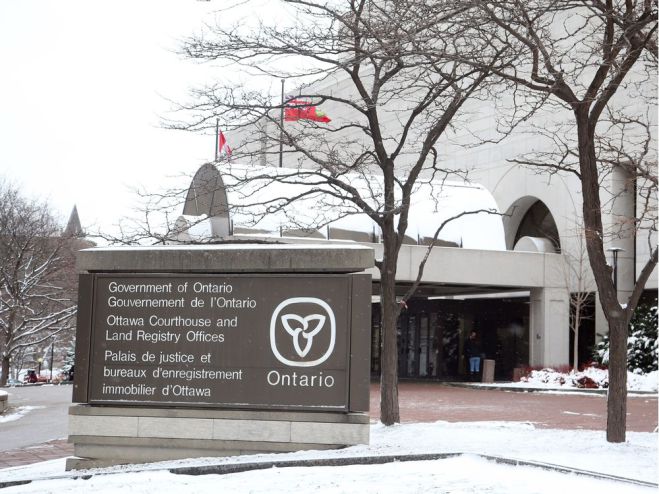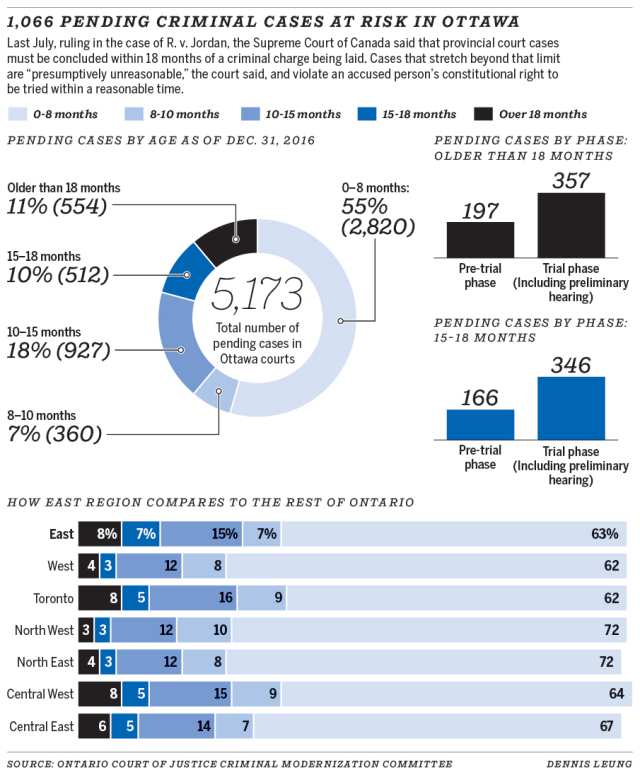Connexion
Dernières nouvelles
Pénurie de procureurs : vers l’abandon de poursuites
Les procureurs de la Couronne craignent le pire devant la crise qui ralentit le fonctionnement du système de justice pénale au Nouveau-Brunswick. Des appels à l’aide ont été lancés depuis deux semaines. Me Yves Duguay, vice-président de l’Association des procureurs de la Couronne du Nouveau-Brunswick et procureur à Bathurst, avoue que ça fait un moment que la situation est inquiétante.
[ ...Suite ]Date de parution : 2024-03-27
B.C. prosecutors' association raises security concerns about Vancouver courthouse following assault
The association that represents B.C.’s roughly 450 Crown prosecutors is raising safety concerns around an East Vancouver courthouse after a member was allegedly assaulted outside last week. "We’re reeling, this has really shaken us to the core to have one of our own attacked right here,” said BCCCA president Adam Dalrymple.
[ ...Suite ]Date de parution : 2024-02-05
Increased number of homicides doesn't bode well for overworked N.L. prosecutors, association says
There are 17 homicide cases before the courts in Newfoundland and Labrador, and the head of the association that represents local prosecutors says the higher-than-normal caseload will be difficult to handle.
[ ...Suite ]Date de parution : 2023-09-07
Manitoba adds 25 Crown attorneys to prosecution service amid workload issues
The Manitoba government hopes to add about two dozen more prosecutors and assistants to the prosecution service, which attorneys say has been struggling to keep up amid workload and workforce issues. Manitoba Association of Crown Attorneys says province left group out of discussions.
[ ...Suite ]Date de parution : 2023-06-26
Les Leyne: Premier David Eby takes on lawyers — again
The B.C. NDP government has introduced a one-page bill that bestows the right to join a union on the 350 lawyers who work for government. There’s a catch. It herds them into a union the government prefers, the Professional Employees Association, rather than allowing them to form their own.
[ ...Suite ]Date de parution : 2023-05-06
'Unfair labour practice': B.C. government accused of blocking union bid by its own lawyers
Lawyers for the B.C. government say the province has ended negotiations with them ahead of legislation they claim aims to block their right to form their own union.
[ ...Suite ]Date de parution : 2023-05-04
<-- Retour au nouvelles archivées
More than 1,000 Ottawa criminal cases 'at-risk' of breaching delay limit
08-03-2018

Provincial statistics show that 1,066 Ottawa cases fell into that category at the end of 2016.
More than half (554) of those had been in the court system for at least 18 months, according to the Ontario Court of Justice Criminal Modernization Committee data.
The East Region — it stretches from Belleville to L’Orignal — had a higher percentage (15 per cent) of cases at-risk at the end of 2016 than any of Ontario’s seven judicial regions.
Delays at the Ottawa courthouse are among the worst in the East Region, with only Cornwall reporting a higher percentage (21.8 per cent) of cases at risk by virtue of being in the system for 15 months or more.
Brampton, the busiest courthouse in the province, had 16 per cent of its cases in the same at-risk category, while Toronto’s Old City Hall — it deals with about as many cases as the Ottawa courthouse — had 19 per cent of its cases at risk.
The numbers released by the modernization committee represent the first detailed picture of the steep challenge posed to the local legal system by the Supreme Court of Canada’s decision in R. v. Jordan.
In that ruling last July, the high court said that provincial court cases must be concluded within 18 months of a criminal charge being laid. Cases that stretch beyond that limit are “presumptively unreasonable,” the court said, and violate an accused person’s constitutional right to be tried within a reasonable time.
The Jordan decision also imposed a 30-month limit on Superior Court of Justice cases.
In Ontario, provincial court cases are dealt with by the Ontario Court of Justice, which handles the vast majority — about 98 per cent — of all criminal matters.
As a result, the impact of the Jordan decision will be felt most keenly in the lower court.
Crown attorneys are now scrambling to triage older cases while also competing for limited judicial resources — courtrooms, judges and per diem Crown attorneys — to move some forward at speed.
The East Region’s senior Crown attorney, Curt Flanagan, recently conducted a “blitz” at courthouses across the region to review cases at risk, and to develop a strategy for dealing with them, the Citizen has learned.
Flanagan could not be reached to discuss the results of that review, but defence lawyers say it’s clear that prosecutors will have to withdraw some charges and make deals on others to avoid having them thrown out of court for delay.

A spokeswoman with the Ministry of the Attorney General, Emilie Smith, said Crown attorneys are “proactively case managing those matters that may be at risk.”
As part of its $25 million a year action plan, she added, the ministry has added resources to the system that allow prosecutors to conduct more judicial pre-trials to move cases forward. “And trial dates have also been moved up for at-risk cases so that they can be completed in a shorter time,” she said.
In Ottawa, people accused of murder, fraud and sexual abuse have had charges stayed because of the Jordan decision during the past four months.
But the delay rulings are not automatic, and Ottawa judges have also rejected a handful of applications to have charges dismissed for unreasonable delay. Judges have to assess each case on its merits, the Supreme Court said, and deduct from the Jordan “ceiling” any delays that can be attributed to defence maneuvers or exceptional circumstances.
Last month, Attorney General Yasir Naqvi appointed three new judges to the Ontario Court of Justice in Ottawa. It followed an earlier announcement in which he unveiled measures aimed at streamlining the bail process.
Naqvi, MPP for Ottawa Centre, has also asked the federal justice minister to change the Criminal Code to eliminate preliminary hearings in all but the most serious criminal cases.
“The Jordan decision really changes the way we have to do things,” Naqvi has said.
Anne London-Weinstein, president of the Defence Counsel Association of Ottawa, said she has already seen some of that change in local courtrooms. “Anecdotally, from my own experience, I sense that there’s an urgency from the bench to get matters pushed forward,” she said.
Crown attorneys, she said, have also been quick to produce disclosure materials, take positions and schedule pre-trial conferences.
“My hope is that Jordan is a spark for reform,” she said, “because our system is in desperate need of a major overhaul.”
Ottawa defence lawyer Lawrence Greenspon said he believes the Jordan decision will bring change.
“The Crown has been basically told the days of complacency regarding someone spending a year, two years, three years at the regional detention centre waiting for trial, those days are over,” said Greenspon, who represents Adam Picard, a former soldier whose first-degree murder charge was stayed in November because of unreasonable delay.
Picard spent more than four years in custody before his case reached trial.
“The reason I’m optimistic is because defence lawyers have been handed a tool to effect change on behalf of their clients,” Greenspon said, “and we’re collectively determined to use that tool to protect our clients’ constitutional rights.”
London-Weinstein said too many people are now held in pre-trial custody, too many accused are unrepresented by lawyers, and too many charges end up being dropped late in the judicial process.
Said Greesnpon: “The truth of the matter is you need more courts, more courtroom staff, more judges, more Crowns.”
Crown and defence counsel agree on the issue of judicial resources.
Writing in Canadian Lawyer magazine, the president of the Ontario Crown Attorneys Association, Kate Matthews, said the growing complexity of cases has made them more difficult to prosecute. “There has been a drastic increase in video evidence, computer and cellphone data and other forms of electronic and scientific evidence,” she said. “We used to measure cases by the number of boxes. Now we measure in terabytes.”
Crown attorneys, she said, must review all of that material, whether it’s for an assault case or murder charge. The sheer volume of evidence generates more pre-trial motions and longer trials.
“The truth is front-line Crowns are drowning under the weight of it,” she said.
Statistics collected by the province’s modernization committee highlight the situation Matthews describes.
The statistics show that one quarter of all the cases that went to trial at the Ottawa courthouse in 2016 took more than 18 months to reach a disposition. That number has climbed steadily since 2011 when only 14 per cent of criminal trials took so long.

